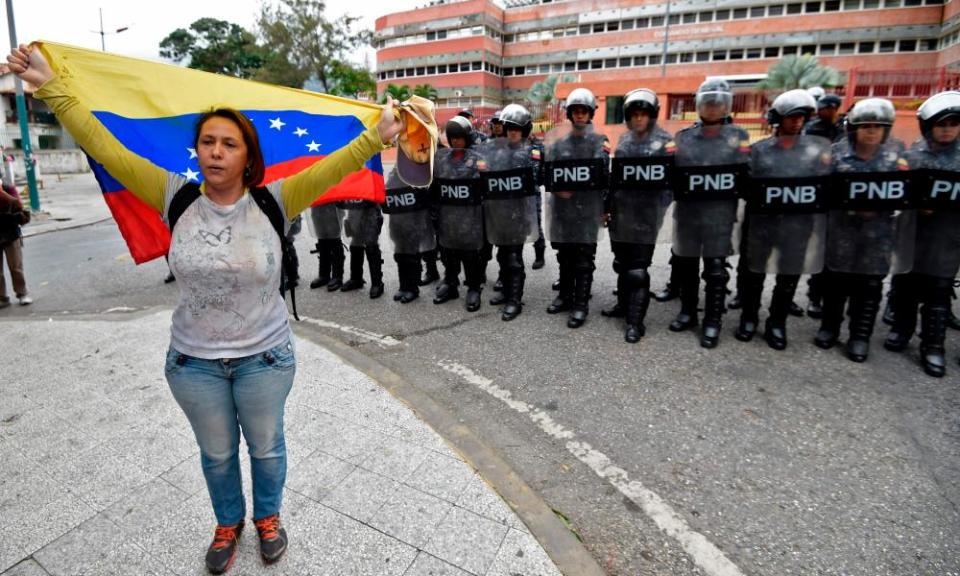‘Hope never dies’: Venezuela opposition ponders what’s next after failed uprising

When the tip off came late on Monday night, Jesús Armas could hardly believe what he was hearing.
“We’re going to have this situation,” a fellow opposition politician confided over the phone, explaining how in six hours Venezuelan troops would sweep onto the streets of Caracas to topple their leader, Nicolás Maduro.
A few hours later - at about 8 or 9am - the head of Venezuela’s supreme court, Maikel Moreno, would make a statement announcing his defection and support for Maduro’s challenger, Juan Guaidó.
Related: The plot that failed: how Venezuela's 'uprising' fizzled
“I thought it was just their imagination or something like that,” Armas said.
But as dawn broke over Venezuela’s capital, the 32-year-old politician found himself on a motorcycle racing towards the La Carlota airbase beside which Guaidó had, in fact, just launched what was supposed to be a decisive mutiny against Maduro.
“This is the end,” Armas remembered thinking. It was not.
The dramatic predawn insurrection quickly unravelled, with Moreno and other top Chavistas reaffirming their backing for Maduro and troops remaining almost entirely loyal to their existing commander-in-chief.
On Saturday, as small groups of protesters returned to the streets, members of Venezuela’s opposition were left pondering what had gone wrong and what is next for their movement to dislodge Hugo Chávez’s unpopular but so far immovable heir.
At a protest in western Caracas, Armas insisted the toothless revolt represented a major advance – and that Venezuela’s strongman leader had come within an inch of his political life.
“I feel really hopeful … They were close [to abandoning] Nicolás Maduro. They were really close to doing that,” Armas said of the trio of alleged Chavista conspirators who reportedly reneged on a secret deal to switch sides at the last minute for reasons that remain unclear.

A woman waves a Venezuelan flag in front of a line of riot police outside the Venezuelan navy command headquarters in the San Bernardino neighborhood in Caracas on 4 May.Photograph: Juan Barreto/AFP/Getty Images
As police carrying shotguns and riot shields circled on motorbikes, some demonstrators voiced similar optimism that despite this week’s setback Maduro’s end was still nigh.
“We know this is the final phase,” said Jesús Magdalena, an organizer from the Acción Democrática opposition party.
María Sojo, 74, a retired chemistry teacher, said: “For me, hope never dies – I continue to think positively.”
But there were also signs of frustration, bafflement and even anger that a historic opportunity to depose a man widely blamed for Venezuela’s economic collapse might just have slipped through the opposition’s fingers.
“How do I feel? I feel confused,” said Cecilia Navarrete, a 50-year-old administrator, lamenting how she still had not been able to understand “the true truth” of what had gone wrong.
“First Marco Rubio says something. Then someone from here says something. And you don’t know who to believe in …. you don’t know what is true,” Navarrete complained.
Manuel Mir, a community leader, said he was troubled the mutiny appeared to have been poorly planned and the work of a tiny circle of opposition leaders including Guaidó and his political mentor, Leopoldo López. “I think what is lacking is genuine unity without such a leading role being given [to a small group],” Mir said.
Others expressed concern that the high-profile involvement of López – who fled house arrest to lead the botched uprising - might have destroyed its chances by spooking conspiring Chavistas who consider him a toxic figure likely to pursue them once in power.
Guaidó has battled to keep his message positive following Tuesday’s abortive uprising, perhaps aware of the emotional blow it has dealt to many.
“I can’t tell you the exact date but soon we will be free,” he insisted on Friday, claiming his peaceful push for change would continue.
But some are losing patience.
María Corina Machado, a prominent opposition leader who supports foreign military intervention to remove Maduro on humanitarian grounds, said the unsuccessful uprising showed it was time “to move to a higher stage”.
“That means a credible, severe and imminent threat should be put in place immediately [by the international community].
“This regime is weak but it is willing to produce a lot of damage before it goes,” Machado warned. “In order to reduce and control the damage we need … the active action and support of western democratic nations.”
Related: Venezuela: Maduro thanks military and denounces 'senseless coup-mongers and traitors'
David Smilde, a Venezuela specialist from the Washington Office on Latin America, said he feared the failure might empower “the hawks around Donald Trump” – among them the US national security adviser, John Bolton – who backed military options to eject Maduro.
“These are people who think sabre-rattling and tough talk and military intervention is a way for the United States to get what it wants around the world,” Smilde said, warning: “I think that would be a really disastrous policy and I hope they do not carry the day.”
Armas said that as a political leader it was his job to explain what had happened and indicate a way forwards.
“We tried to bring down Nicolás Maduro … and we couldn’t accomplish this plan,” he admitted. “But … I think we are going to win … The most difficult challenge we have … is to keep alive the leadership of Juan Guaidó.”
For all her optimism, Sojo said she felt less certain about the future and feared Maduro and his inner circle were determined to retain power.
“They won’t leave unless we stick them in a space rocket and send them to the moon,” she said.

